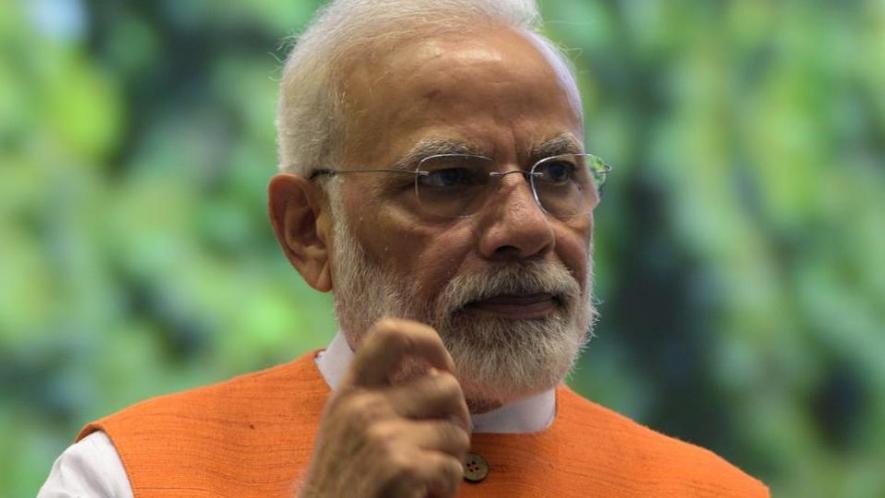Era of Information Blackout in Modi’s India

Image Courtesy: Hindustan Times
Ever since a whistleblower revealed what the United States President Trump and Ukranian President Volodymyr Zelensky had chatted on telephone on July 25, 2019, Trump has been barrelling towards impeachment proceedings in his country. But in India, Trump’s ideological friend, Prime Minister Narendra Modi, has placed a leak-proof lid on information.
Indians do not even know what the educational qualifications their prime minister has, but that is not all. The thin line between press and party or government and nation is disappearing quickly. Case in point: For the first time last week, public service broadcaster Prasar Bharti tweeted distasteful words about Pakistan in the context of India’s response at the United Nations to its neighbour. Prasar Bharati's official handle said: “The troll Prime Minister of Terrorism gets a fitting reply.”
This tweet completes a picture that Prasar Bharati’s chairman A Surya Prakash had started painting at the Global Conference for Media Freedom held in London this year. He adopted a hectoring tone as he attempted to silence Vinod Jose, executive editor of The Caravan magazine. For bringing up RSS-engineered pogroms and their marginalisation of religious minorities, Jose was targeted with the epithet of being “blatant[ly] anti-India”.
Then DD News came in like a Bharatiya Janata Party (BJP) spokesperson and ran a programme and published an online story slamming Jose, who has remarked on what ails Indian media in this piece, published in 2013. Journalism in India has been reduced to publishing statements of office-bearers of the ruling party. It has nothing to do with fact checking the ground reality or speaking truth to power. For all the road shows of the prime minister they attend and publish glowing reviews of, they still have to inhale the bitter rebukes of Home Minister Amit Shah.
The primetime faces of Indian media could not protest when Modi indulged in an old habit, refusing to field any questions in his first so-called press conference as prime minister. “Where do you find these reporters,” Trump asked Modi (and the Pakistan prime minister Imran Khan) during his recent US trip. This disparaging statement was accepted as a complement by some media outlets, which ran it as a promotional spot, until reality dawned and it was deleted. These are not an account of an otherwise independent media’s missteps and fails. This is a troll and misinformation army working for the BJP while wearing the plainclothes of journalists.
During the general elections 2019, Rahul Gandhi, president of the Congress party, used the term “pliable” for India’s biggest news agency for failing to pose tough questions to Modi. However, the Press Club of India, the Indian Women's Press Corps and the Press Association refused to take this lying down, although worse things have been said about them.
Columnist Sujata Anandan wrote a piece in the Congress mouthpiece National Herald arguing that “large sections of journalists in India have been pliant towards reigning governments for all times. And that pliability has much of the time been voluntary, at times embarrassing even for those they have been pliant towards.” She points out that the current regime is a “step ahead” of media owners. “...by pressurising the private entrepreneurs to withdraw advertisements from various channels and newspapers leaving owners with no choice but to sack their more independent or rebellious journalists...”
The goal of Indian media in these dark times must be factual and unchallengeable. That is the only way it will be able to counter the coercive political regime that devours the truth in banter and parody. The media is a watchdog but it is not elected by the people. Accountability to the people lies with the elected government. This is why the blackout of public information should be the epicentre of public discourse.
Consider what the Modi government has done to the Right to Information or RTI Act. It has not revoked the law but employed a trick: The trigger has been pulled on the public information officers. With tweaks in their salaries and promotions, it has curtailed their independence and importance, from the top to the bottom of the hierarchy at both the Centre and the states.
Over time, by cultivating and institutionalising delays, and by undercutting those who man the institution, the value of the information accessed through RTI has been decimated. For instance, it would be tyrannical to imagine that a tribal from Dang would travel to Delhi to challenge a local authority who has blocked his access to information.
This is not a shallow proposition. This author followed for more than a year how the RTI Act was functioning under BJP rule. The experiment tested the central information authorities and the information-dissemination mechanisms in place under two BJP governments, those of Gujarat and Bihar.
On the eve of Independence Day, 2018, the Gujarat police thrashed students, manhandled faculty members and created chaos in the prestigious campus of Maharaja Sayajirao University Baroda (MSU). The local police denied this author information related to the incident, saying it fell afoul of section 2(f) of the RTI Act, which defines what “information” is under the Act. During appeal, the Vadodara zonal DCP, the first appellate authority, denied that any such incident had taken place, so there was no information available on it. (Essentially, it appeared that the victims had turned hostile and the case was dropped.) However, this author came under the Gujarat Police radar and he was threatened and beaten.
Similarly, data related to the agrarian crisis was denied by the ministry of Agriculture and Farmers Welfare last year. The ministry had no idea if any study was conducted in the recent past on the nationwide agrarian distress. Also, the Directorate of Pulses Development did not respond to queries seeking the internal report examining why there was a hike in imports of even those pulses which are sown in India. Eleven months after filing an appeal, the request is yet to be answered.
The National Investigation Agency or NIA, which recently arrested several politicians, activists and alleged terrorists in Jammu and Kashmir (J&K), also declined to provide any information to this author, citing Section 24 [exemption of security-related matters and security agencies]. Then the Ministry of Home Affairs refused to provide information related to people arrested or detained in Jammu and Kashmir between August 5 and August 19, along with the offences and causes. The director, J&K, in the ministry responded that it has no knowledge of such arrests or police/judicial custody or the number of prisoners.
The MHA also said that it has no information related to pellet gun victims or damage caused by security forces deployed in J&K to civilians. During appeal, the additional secretary (the first appellate authority) said that the Central Public Information Officer has already replied to the applicant with available information. The response also said that “...it is also held by CIC that CPIO is not required to furnish information which require drawing of inference and/or making of assumption or to interpret information or to solve problems raised by applicants or to furnish replies to hypothetical questions”.
The query demanding information related to the funds discharged by the government of India to rebuild and restore civilian possessions again got no reply. And, to a query on security force’s deployment in J&K, including information on divisional units—a query built on the premise of examining human rights violations—the MHA responded that it cannot be shared in the national interest, as dictated by section 8(1)(a) of RTI Act, which relates to India’s sovereignty and national interest.
It is interesting to focus on one reply provided by MHA, that “the information [related to J&K] might be available with the state government of J&K.” It further added that “the author’s application cannot be transferred to the state government as the RTI Act 2005, is not applicable in the state of J&K.”
At least 106 central laws are set to come into effect in J&K starting November 1, when it formally became a Union Territory. But it is being said that the Forest Rights Act, 2006, is not going to be implemented in J&K. The Gujjar-Bakarwal community, which believed that reading down of Article 370, would help them, feel cheated. This also raises doubts on how RTI Act will work under restraints of the Armed Forces (Special Powers) Act (AFSPA) and Public Safety Act (PSA).
American sociologist Dwight G Dean, in his seminal work, Powerlessness and Political Apathy, studied the correlation of powerlessness with disparate manifestations of apathy: interest apathy, voting apathy and information apathy. Dean’s arguments are based on a study conducted by American political theorist Charles Merriam, a pioneer in research into the phenomenon of people who choose not to vote.
Dean’s work concludes that a voter, who witnesses complex political and socioeconomic issues in terms of “good versus bad” or “strong versus weak”, ends up feeling besieged by a sense of “powerlessness”. He argues that this can result in political apathy as well. The conclusion makes it tempting to draw a parallel with the current Indian political scenario. The BJP has been ginning up an environment of powerlessness in order to serve its political interests—catalysing apathy.
The information apathy it is kindling is one of the fundamental reasons why the Indian electorate feel alienated today. While mainstream media organisations have completely sealed tight any dissemination of information in the public interest, alongside, the government is demolishing the powerful tool of RTI. The indelible marks of desolation this government is leaving behind will not only hamper democracy but brings to mind the cartoonist RK Laxman’s legendary common man, near-powerless in the crowd, who knows he must pay the price for all that ails politics and governance.
India’s alienated youth will be diverted to communal issues with a majoritarian mindset while the Hindu right will continue to claim that it is reviving past glories while questions on the dilapidated state of the economy, joblessness and welfare will be kept under a lid. Cas Mudde, an authority on right-wing populism, commented on the Howdy Modi event, “...things have changed. What was once an electoral liability is now a political asset. In fact, more than anything, Modi and Trump are united in their Islamophobia.”
The information blackout is part of this process, fostering apathy and darkness which sustains the BJP’s unique and perverse brand of politics.
Ujjawal Krishnam writes on social inequality and rights.
Get the latest reports & analysis with people's perspective on Protests, movements & deep analytical videos, discussions of the current affairs in your Telegram app. Subscribe to NewsClick's Telegram channel & get Real-Time updates on stories, as they get published on our website.
























